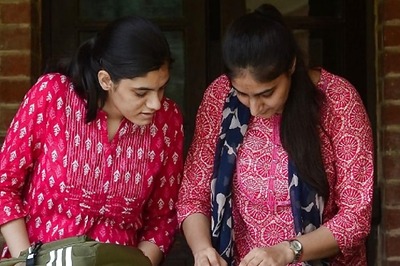
views
Minsk: Police used tear gas to break up an anti-government protest in Belarus and forcefully detained dozens of demonstrators on Sunday in the capital.
The authoritarian government had tried to thwart the protest by blocking access to Facebook, Twitter and a major Russian social networking site used by the organisers. The government also deployed thousands of police and secret service agents in central Minsk as an additional deterrent.
But about 700 or 800 people gathered anyway on a central square. Using a new tactic introduced by young activists this summer, they did not hold signs or chant, but instead clapped their hands in unison to show their opposition to President Alexander Lukashenko.
Public discontent is swelling as Belarus experiences its worst financial crisis since the fall of the Soviet Union.
"The USSR has come back," said Tatyana Segalskaya, a 30-year-old demonstrator. "It is dictatorship in the middle of Europe. People are detained for nothing. The worse the economic concerns are, the tougher repressions become."
Rights group Vesna said more than 200 demonstrators were detained in Minsk, while similar protests were held in at least six other cities.
Lukashenko, appearing earlier Sunday in full military dress, warned that "an escalation of information intervention is under way" in Belarus as part of plans drawn up in "the capitals of separate countries" to bring about a popular revolution.
"We understand that the goal of these attacks is to sow uncertainty and alarm, to destroy social harmony, and in the end to bring us to our knees and bring to naught the achievements of our independence," Lukashenko said in opening a military parade on Independence Day, the anniversary of the end of Nazi occupation in 1944. He wore a military uniform, as did his 6-year-old son.
Belarus is under pressure from Russia and the West. Moscow has been pushing for greater control over the Belarusian economy in exchange for loans to help Lukashenko's government weather the financial turmoil, while the European Union has threatened to expand sanctions imposed on Lukashenko as punishment for his crackdown on the opposition.
For the first time, Russian troops took part in the annual military parade. Russian state television, which broadcasts in Belarus, has supported the Belarusian protesters by showing their rough treatment at the hands of police.
A new opposition group called 'Revolution by Social Networks' has held a series of Internet-organized rallies on Wednesday evenings for the past month. The rallies have been held in about 30 cities and have drawn thousands of protesters.
Eager to avoid protests on the national holiday, the government on Saturday began blocking access to the social media sites, including VKontakte, a Russian version of Facebook.
The opposition group appealed to Russian authorities on Sunday to respond to the Belarusian government's interference, activist Vyacheslav Dianov said.




















Comments
0 comment